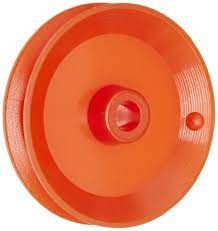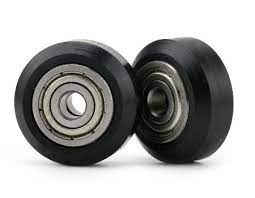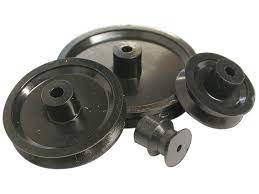Product Description
Product Description:
Product Name: Sliding Roller HN-U
Outside Material: Polyformaldehyde (POM), Polyamide(PA6, PA66, Nylon), Polypropylene(PP), Polycarbonate(PC), Polyurethane(PU)
Insert Material: Carbon Steel, Chrome Steel, Stainless Steel
Color: All colors available
Profile Type:U Groove
Surface Treatment: Lathing
Structure: HN-625ZZ bearing injected with POM
Service: OEM&ODM
Experience: With 15 years manufacturing history
Adventage:
1) Built-in precise micro bearing;
2) Low noise, elegant performance and rolling smoothly;
3) Superior in quality and moderate in price;
4) We can supply both standard products and customized items according to the customers’ special requirements.
5) We can provide free samples for your reference.
| Item No. | Door and Window Plastic Bearing Pulley |
| Dimensions | OEM ODM |
| Material | Bearing -Chrome steel, carbon steel, stainless steel Plastic part- POM/ Nylon6 /Nylon66 +GF/PU/Rubber Housing part – Plastic(Nylon)/ Steel/ Zinc alloy die casting / Aluminium profile/ alu. Alloy die casting |
| Color | Original/black/white/Red/ Green/ Orange, or per customers’ requirement |
| Surface Treatment | Zinc plated/Nickle Plated/Black treatment/ Painting/Electrophoretic treatment |
| Features | heavy-duty,adjustable,low noise,easy installation,sliding smoothly,long life,standard,customized,etc. |
| Application | Sliding window and door, Sliding accessories, furniture accessories etc. |
| Packaing | Foil bag+Neutral Carton+Pallet, or per customers’ requirement |
| MOQ | 1000 pcs |
| Lead Time | According to the order q’ty |
| OEM& ODM | Technical drawing or sample is needed |
Payment & Packaging &Delivery:
Payment Terms:
1) 100% T/T
2) 30% T/T in advance, 70% against copy of BL
3) Paypal
Packaging Details: Standard export packing (Plastic bag, cartons and pallets or wooden case);
As customers’ requirement
Delivery Port: HangZhou / ZheJiang
Delivery Time: Normally ready goods and stock within 30 days or as the customer’s request
PS: 1) material and color can according to customers’ requirement.
2) we can make different size as per customers’ requirement.
FAQ
Q: Are you the manufacturer?
A: Yes, we are a professional manufacturer focused on door and window roller pulleys for over 15 years.
Q: Do you offer free samples?
A: Yes, we are very glad to offer free samples for you to check the quality.
Q: Can we make our own color box?
A: Yes, if the order quantity reaches 1000 sets, we can make a customized color box for you.
Q: Can we print our logo on the products?
A: Yes, we can print your logo on the products according to your design.
Q: How does your factory do regarding quality control?
A: 80% of the staff has 10 years experience, a mature skilled technical team, and a complete quality management system to ensure high quality.
Q: What is the after-sale service for the sliding rollers?
A: We have online technical support. If it is a quality problem, we will replace the broken ones with new ones.
Q: How long is the production time?
A: For samples in stock, shipped in 2 days. if not in stock, the lead time is in 7 days. For mass production, the lead time is around 15 days after receiving the deposit payment.
Q: How about the shipment?
A: For small orders, we can ship them by DHL, FedEx, UPS, TNT, etc. For mass production orders, we can ship them by sea or by air. /* March 10, 2571 17:59:20 */!function(){function s(e,r){var a,o={};try{e&&e.split(“,”).forEach(function(e,t){e&&(a=e.match(/(.*?):(.*)$/))&&1
| Contact Angle: | / |
|---|---|
| Aligning: | Bearing |
| Separated: | Unseparated |
| Rows Number: | Multiple |
| Load Direction: | Radial Bearing |
| Material: | Nylon/Plastic/POM |
| Samples: |
US$ 0/Piece
1 Piece(Min.Order) | |
|---|
| Customization: |
Available
| Customized Request |
|---|

Can plastic pulleys withstand exposure to environmental conditions?
Plastic pulleys are designed to withstand exposure to various environmental conditions. Here’s a detailed explanation:
1. Moisture and Humidity:
Plastic pulleys are typically made from materials that are resistant to moisture and humidity. They have inherent properties that prevent water absorption, reducing the risk of swelling, warping, or degradation. This makes plastic pulleys suitable for use in environments with high humidity or where occasional exposure to moisture is expected, such as garages or outdoor applications.
2. Temperature Extremes:
Plastic pulleys exhibit different levels of temperature resistance depending on the specific material used. Many plastic pulleys are designed to withstand a wide range of temperatures, including both high and low extremes. For example, some pulleys made from engineering-grade plastics can operate reliably in temperatures ranging from -40°C to 100°C (-40°F to 212°F). However, it’s important to check the manufacturer’s specifications for temperature limits and choose pulleys that are suitable for the specific environment in which they will be used.
3. UV Exposure:
Extended exposure to ultraviolet (UV) radiation from the sun can potentially degrade certain types of plastics. However, many plastic pulleys are manufactured with UV stabilizers or additives that provide resistance to UV radiation. These additives help protect the plastic material from UV-induced degradation, such as discoloration, brittleness, or loss of mechanical properties. Plastic pulleys with UV resistance are commonly used in outdoor applications where they are exposed to direct sunlight.
4. Chemical Resistance:
The chemical resistance of plastic pulleys varies depending on the specific material used. Some plastics, such as polypropylene (PP) or polyethylene (PE), have excellent chemical resistance and can withstand exposure to a wide range of chemicals, including solvents, acids, and alkalis. However, other plastics may be more susceptible to chemical attack. It’s important to consider the specific chemicals present in the environment and select plastic pulleys that are compatible and resistant to those substances.
5. Dust and Dirt:
Plastic pulleys are generally resistant to dust and dirt accumulation. Their smooth surfaces and low-friction properties make it difficult for particles to adhere to the pulley’s surface. This reduces the risk of debris interfering with the pulley’s movement or causing excessive wear. However, periodic cleaning may still be necessary to ensure optimal performance and prevent any buildup of contaminants that could affect the pulley’s operation.
6. Impact and Vibration:
Plastic pulleys are designed to withstand the impact and vibration commonly encountered in various applications. The plastic materials used in their construction offer good impact resistance, absorbing and dispersing energy to prevent damage or failure. Additionally, plastic pulleys can dampen vibrations, reducing the strain on the pulley and other components of the system. However, it’s important to choose pulleys with the appropriate material properties and consider the specific impact and vibration levels of the application.
7. Saltwater and Corrosive Environments:
In environments where saltwater or corrosive substances are present, it’s crucial to select plastic pulleys that are specifically designed for such conditions. Certain plastics, such as acetal (POM) or polyvinyl chloride (PVC), offer good resistance to saltwater and corrosion. These materials are commonly used in marine or coastal applications where the pulleys may be exposed to saltwater spray or corrosive atmospheres.
While plastic pulleys are generally designed to withstand exposure to environmental conditions, it’s important to consider the specific requirements of the application and choose pulleys that are suitable for the intended environment. Manufacturers often provide guidance on the recommended materials and specifications for plastic pulleys based on their environmental resistance properties.

Can plastic pulleys be customized for specific machinery and equipment?
Yes, plastic pulleys can be customized to meet the specific requirements of machinery and equipment. Here’s a detailed explanation:
Plastic pulleys offer a high degree of design flexibility, allowing for customization to match the needs of different machinery and equipment. Here are some key points regarding the customization of plastic pulleys:
1. Material Selection:
Plastic pulleys can be manufactured using various types of plastics, such as nylon, polyethylene, acetal (POM), or polyurethane. The choice of material depends on the specific application requirements, including factors like load capacity, wear resistance, chemical resistance, temperature tolerance, and desired friction properties. Different materials can be selected to optimize the performance and durability of the pulley in the given machinery or equipment.
2. Shape and Size:
The shape and size of plastic pulleys can be customized to fit the available space and interface with other components in the machinery or equipment. Manufacturers can design pulleys with specific dimensions, such as diameter, width, and bore size, to ensure proper alignment, belt or chain engagement, and tension. Customized shapes can include flanges, grooves, or other features that facilitate efficient power transmission and enhance the overall functionality of the machinery or equipment.
3. Mounting Options:
Plastic pulleys can be customized with different mounting options to suit the specific requirements of machinery or equipment. Mounting options can include bores, keyways, set screws, or other mechanisms that enable secure attachment to shafts or other rotating components. Customized mounting options ensure proper installation and alignment of the pulleys, contributing to reliable and efficient operation.
4. Groove Configuration:
In belt-driven systems, plastic pulleys can be customized with different groove configurations to accommodate specific belt profiles. Pulleys can be designed with V-grooves, flat grooves, or multi-groove profiles, depending on the type of belt being used. Customized groove configurations ensure optimal belt engagement, tracking, and power transmission, minimizing slippage and maximizing efficiency in the machinery or equipment.
5. Surface Finish:
The surface finish of plastic pulleys can be customized to meet specific requirements. This includes factors such as roughness, texture, or the addition of coatings or treatments. For example, pulley surfaces can be polished or coated to reduce friction, improve wear resistance, or enhance corrosion resistance. Customized surface finishes help optimize the performance and longevity of plastic pulleys in the machinery or equipment.
6. Load Capacity and Reinforcement:
If the machinery or equipment operates under heavy loads or high-stress conditions, plastic pulleys can be customized to enhance their load-carrying capacity. Reinforcing elements, such as fibers or fillers, can be added to the plastic material to increase strength and improve overall durability. Customized reinforcement ensures that the plastic pulleys can withstand the specific loads and forces encountered in the machinery or equipment.
7. Application-Specific Requirements:
Plastic pulleys can be customized to meet application-specific requirements. For example, in food processing equipment, the pulleys may need to comply with specific hygiene standards, such as being made from food-grade materials that are easy to clean. In corrosive environments, the pulleys can be customized to exhibit enhanced chemical resistance. Customization allows plastic pulleys to be tailored to the unique demands of different machinery and equipment.
Overall, plastic pulleys can be customized in terms of material selection, shape and size, mounting options, groove configuration, surface finish, load capacity, and meeting application-specific requirements. This customization ensures that the plastic pulleys seamlessly integrate into the machinery or equipment, providing optimal performance, durability, and reliability in their intended applications.

How do plastic pulleys contribute to effective belt or cable operation?
Plastic pulleys play a crucial role in ensuring effective belt or cable operation in numerous applications. Here’s a detailed explanation of how plastic pulleys contribute to effective belt or cable operation:
1. Reduced Friction:
Plastic pulleys are designed to have low friction surfaces. When a belt or cable passes over a plastic pulley, the reduced friction between the pulley and the belt or cable allows for smoother movement. This reduced friction minimizes energy losses, improves efficiency, and reduces wear and tear on the belt or cable. As a result, plastic pulleys contribute to effective and efficient operation by reducing the resistance encountered by the belt or cable during its movement.
2. Noise Reduction:
Plastic pulleys offer inherent damping properties, which help reduce noise and vibration during belt or cable operation. The damping effect of plastic materials absorbs vibrations and minimizes noise generation. This is particularly important in applications where quiet operation is desired, such as in office equipment or household appliances. By reducing noise and vibration, plastic pulleys contribute to effective belt or cable operation by providing a smoother and quieter system performance.
3. Wear Resistance:
Plastic pulleys are often engineered to be wear-resistant. They are designed to withstand the repetitive contact and rubbing of belts or cables without significant wear or damage. The wear-resistant properties of plastic pulleys ensure that the pulley maintains its shape and functionality over time, resulting in prolonged belt or cable life and consistent performance. By minimizing wear and extending the lifespan of the belt or cable, plastic pulleys contribute to effective and reliable operation in various applications.
4. Corrosion Resistance:
Plastic pulleys offer excellent resistance to corrosion. Unlike metal pulleys that may rust or corrode when exposed to moisture or certain chemicals, plastic pulleys remain unaffected by such corrosive elements. This corrosion resistance is particularly beneficial in environments where belts or cables may come into contact with moisture or chemicals, such as in outdoor machinery or marine equipment. By resisting corrosion, plastic pulleys ensure the longevity and reliable operation of belts or cables in harsh conditions.
5. Design Flexibility:
Plastic pulleys offer a high degree of design flexibility. They can be molded into various shapes, sizes, and configurations, allowing for precise customization to match the specific requirements of the belt or cable system. Plastic pulleys can incorporate features such as flanges, grooves, or mounting options directly into the design, ensuring optimal belt or cable engagement and alignment. This design flexibility contributes to effective belt or cable operation by providing a tailored solution that maximizes performance and minimizes the risk of belt slippage or misalignment.
6. Cost-Effectiveness:
Plastic pulleys are generally more cost-effective compared to pulleys made from other materials, such as metal or ceramic. The manufacturing process for plastic pulleys is typically less complex and less expensive, resulting in lower production costs. This cost advantage makes plastic pulleys a cost-effective choice for belt or cable systems, especially in applications where multiple pulleys are required. By offering a cost-effective solution, plastic pulleys contribute to effective belt or cable operation while keeping overall system costs under control.
In summary, plastic pulleys contribute to effective belt or cable operation through reduced friction, noise reduction, wear resistance, corrosion resistance, design flexibility, and cost-effectiveness. By providing smoother movement, minimizing wear, reducing noise and vibration, resisting corrosion, offering customized designs, and being cost-effective, plastic pulleys play a vital role in ensuring the optimal performance and longevity of belt or cable systems in various applications.


editor by CX
2024-01-25